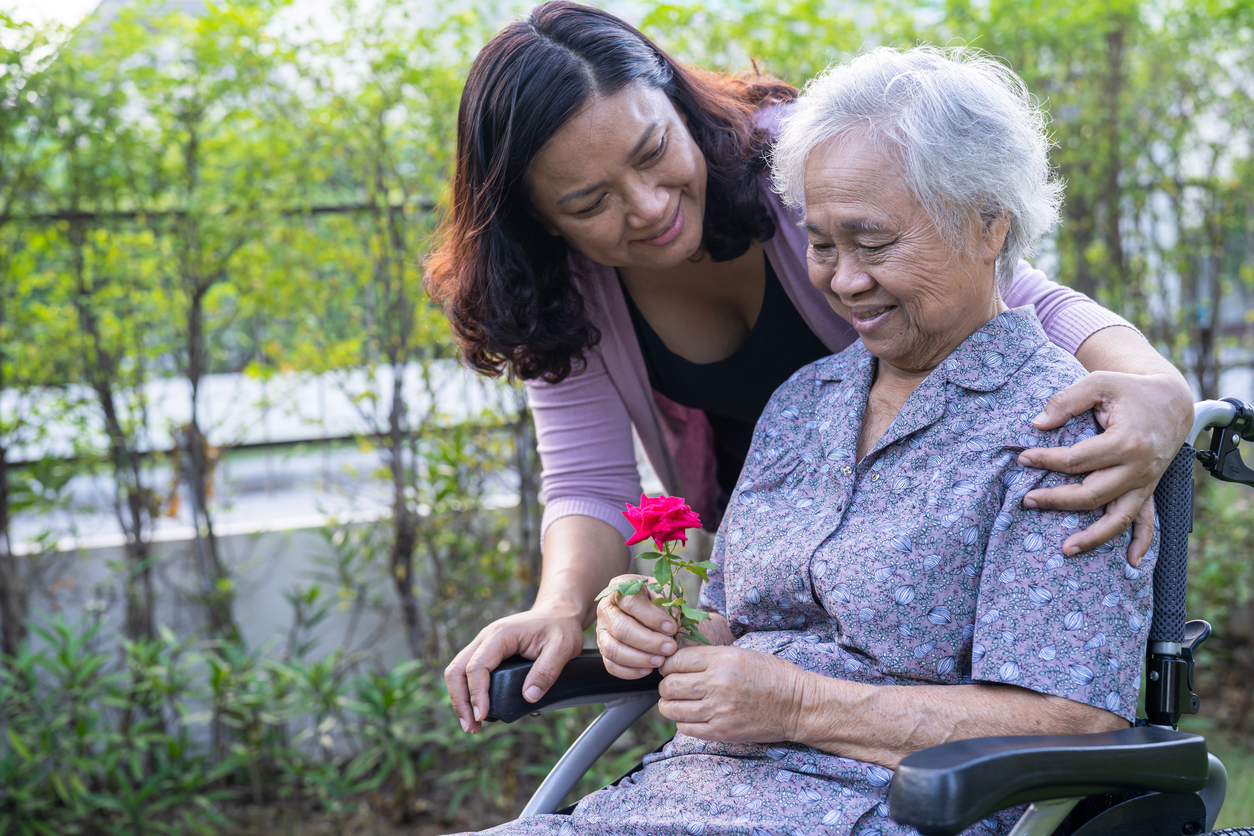

By Kristina Lubofsky
Summertime is here, and there is usually (weather permitting!) an emphasis on getting outside to enjoy some sunshine and fresh air. There are so many benefits to enjoying the great outdoors, including improvements in mood and mental health, boosts to the immune system, and help regulating sleep. In essence, being outside can help us feel revitalized, calmer, and more focused.
Even small amounts of sunshine can make a big difference in our health. Research has shown that there are important benefits to enjoying fresh air and sunshine, including:
Of course, we also know too much sunshine can be a bad thing. Sunburn, skin cancer, eye damage, dehydration, and heat stroke are all dangerous effects the sun can have on humans. To be safe, be sure you and your loved ones wear sunscreen and/or sun-protective clothing and sunglasses with UV protection, along with frequent hydration and taking breaks from the sun in the shade as much as possible.
For friends or loved ones with dementia, the advice to get some summer outdoor fun is also important, though even the best efforts can be thwarted by things beyond your control (think: extreme weather, mobility challenges, or a bad case of the “I don’t wannas”).
But there are lots of ways to adapt activities for your loved one with just a little bit of creativity.
Going for a walk
If your loved one is able to, take them out for a stroll, even if it’s just to the end of the driveway or down the street. Comment on what you hear, see, and smell, tapping into their senses to enhance the experience.
Adaptation: Too hot? Mobility problems stopping you? Sit by a window, open it up, and stare outside. You can still comment on what you’re able to see and hear, which can open up a great line of communication.
Adaptation: Still too hot to open a window? There are plenty of videos online of people walking through nature. Though you won’t get the benefits of the sunshine or fresh air, this is still a great way to “explore” and chat about what you see. Try this channel to get started.
Gardening
Green thumbs, gather round! Round up some potting soil, flower pots, seeds/seedlings, and gardening gloves. Sit at a table and pot some plants together. As a bonus, this is an activity you can keep coming back to, for watering plants and noticing their growth.
Adaptation: If gardening with real plants isn’t up your loved one’s alley, try flower arranging instead. Dollar stores frequently sell craft supplies, including pots, flower foam, fake flowers, and even moss. Snip the flower bunches into individual stems, pop the flower foam into the container of choice, and let your loved one arrange the flowers that way.
Beach day
Sitting and looking out over a body of water can be very calming and relaxing. If it’s possible, try to find a place near water that’s on solid ground. Many beaches and lakes have sidewalks with benches, so your loved one can reap the benefits of being at the beach without having to set foot in the sand.
Adaptation: Not everyone lives by a beach, and even if they do, walking in sand can be a real challenge for people with mobility issues. Head to a dollar store or craft store and gather up a container, some sand, and seashells or sea glass. Let your loved one add the sand and sea things to the container, and then pour some water in. This sensory activity allows your loved one to experience those sandy beaches without ever having to set foot on one.
Adaptation: To make it a little less messy and a little more reusable, try adding the sand and seashells to a clear, leak-proof tube or jar. Flipping it upside down over and over taps into their dexterity and hand-eye coordination, while they still experience the sensory benefits of beach life.
Kristina Lubofsky, MS, is a gerontologist certified in brain health and dedicated to enriching the lives of older adults. After the third Alzheimer’s diagnosis in her family, she founded a company that distributes activities designed to promote learning, better brain health, and quality of life for older adults, via a subscription box delivered each month. As a caregiver, she would bring activities to her grandmother as a way to connect. She knew her fellow caregivers were constantly searching for ways to connect with their own loved ones with dementia and wanted to make these types of activities readily available without adding additional burden on caregivers. Her company, Busy Minds, fills these underserved needs, all while promoting better brain health by targeting different areas of the brain with each collection of activities. You can read more about Kristina’s work and the Busy Minds Box by clicking here.